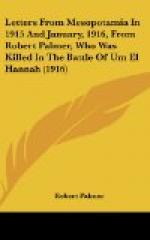This is a most desolate place. Apart from the village with its few palms and gardens there seems not to be a blade of vegetation within sight. To the N.E. the Persian hills are only fifteen miles away. They have still a little snow (did I mention that the storm which gave us rain at A. had capped these hills with a fine snow mantle?)
Here we found “D” Co., which got stranded here when “A” Co. got stuck in C. We are about forty-five or fifty miles from C. as the crow flies, and the guns can be heard quite plainly: but things have been very quiet the last few days. There is an enemy force of 2,000 about ten miles from here, but how long they and the ones at C. will wait remains to be seen.
We know nothing of our own movements yet and I couldn’t mention them if we did. We have been put into a different brigade, but the brigadier has not been appointed yet. The number of the brigade equals that of the ungrateful lepers or the bean-rows which Yeats intended to plant at Innisfree. We are independent of any division.
A mysterious Reuter has come through about conscription. As it quotes the Westminster as saying Asquith has decided on it, I’m inclined to believe it: but it goes on to talk obscurely of possible resignations and a general election.
This may catch the same mail as my letter to Mamma from A.
P.S. Please tell Mamma that just as we were embarking, the S. and T. delivered me two packages, which turned out to be the long-lost blue jerseys. So there is hope for the fishing rods yet.
* * * * *
Monday, January 10, 1915.
TO HIS MOTHER.
I will use a spare hour to begin an account of our doings since I last wrote, but I don’t know when I shall be able to finish it, still less when post it.
We left B. last Thursday morning and were told we should march sixteen miles: we marched up the right bank, so our left flank was exposed to the desert, and “D” Company did flank guard. My platoon formed the outer screen and we marched strung out in single file. There were cavalry patrols beyond us again, and anyway no Arab could come within five miles without our seeing him, so our guarding was a sinecure.
We paraded as soon as it was light, at 7.15 a.m., but owing to the transport delays, the column did not start till after 9.0. The transport consists of: (a) ships and barges; (b) carts, mules and camels. Each has its limitations. Ships tie you to the river-bank, so every column must have some land transport. Camels can hardly move after rain: they slip and split themselves. The carts are fearfully held up by the innumerable ditches which are for draining the floods back to the river. There are not nearly enough mules to go round and they only carry 160lbs. each. So you can imagine our transport difficulties. The country supplies neither food, fodder nor fuel. Our firewood comes from India. If you leave the river you must carry every drop of drinking water. So the transport line was three times as long as the column itself, and moved more slowly.




